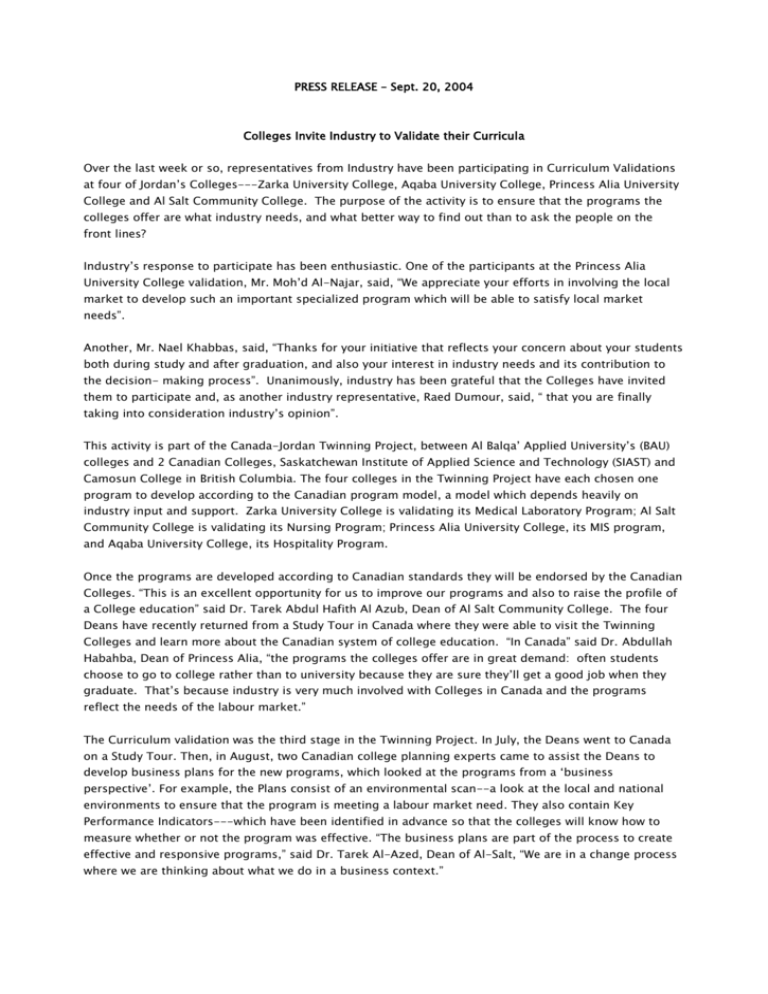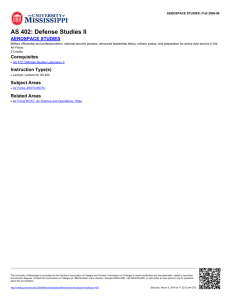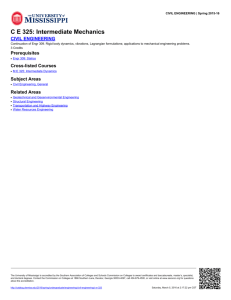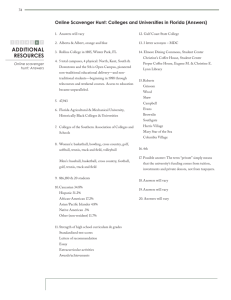Curriculum Validation at Colleges, Sept. 20, 2004
advertisement

PRESS RELEASE – Sept. 20, 2004 Colleges Invite Industry to Validate their Curricula Over the last week or so, representatives from Industry have been participating in Curriculum Validations at four of Jordan’s Colleges---Zarka University College, Aqaba University College, Princess Alia University College and Al Salt Community College. The purpose of the activity is to ensure that the programs the colleges offer are what industry needs, and what better way to find out than to ask the people on the front lines? Industry’s response to participate has been enthusiastic. One of the participants at the Princess Alia University College validation, Mr. Moh’d Al-Najar, said, “We appreciate your efforts in involving the local market to develop such an important specialized program which will be able to satisfy local market needs”. Another, Mr. Nael Khabbas, said, “Thanks for your initiative that reflects your concern about your students both during study and after graduation, and also your interest in industry needs and its contribution to the decision- making process”. Unanimously, industry has been grateful that the Colleges have invited them to participate and, as another industry representative, Raed Dumour, said, “ that you are finally taking into consideration industry’s opinion”. This activity is part of the Canada-Jordan Twinning Project, between Al Balqa’ Applied University’s (BAU) colleges and 2 Canadian Colleges, Saskatchewan Institute of Applied Science and Technology (SIAST) and Camosun College in British Columbia. The four colleges in the Twinning Project have each chosen one program to develop according to the Canadian program model, a model which depends heavily on industry input and support. Zarka University College is validating its Medical Laboratory Program; Al Salt Community College is validating its Nursing Program; Princess Alia University College, its MIS program, and Aqaba University College, its Hospitality Program. Once the programs are developed according to Canadian standards they will be endorsed by the Canadian Colleges. “This is an excellent opportunity for us to improve our programs and also to raise the profile of a College education” said Dr. Tarek Abdul Hafith Al Azub, Dean of Al Salt Community College. The four Deans have recently returned from a Study Tour in Canada where they were able to visit the Twinning Colleges and learn more about the Canadian system of college education. “In Canada” said Dr. Abdullah Habahba, Dean of Princess Alia, “the programs the colleges offer are in great demand: often students choose to go to college rather than to university because they are sure they’ll get a good job when they graduate. That’s because industry is very much involved with Colleges in Canada and the programs reflect the needs of the labour market.” The Curriculum validation was the third stage in the Twinning Project. In July, the Deans went to Canada on a Study Tour. Then, in August, two Canadian college planning experts came to assist the Deans to develop business plans for the new programs, which looked at the programs from a ‘business perspective’. For example, the Plans consist of an environmental scan--a look at the local and national environments to ensure that the program is meeting a labour market need. They also contain Key Performance Indicators---which have been identified in advance so that the colleges will know how to measure whether or not the program was effective. “The business plans are part of the process to create effective and responsive programs,” said Dr. Tarek Al-Azed, Dean of Al-Salt, “We are in a change process where we are thinking about what we do in a business context.” In this current activity, the Curriculum Validation, industry is being led through a process of validating each and every part of the curriculum of the pilot programs. The industry representatives are ranking the relative importance of the programs’ Learning Outcomes, and identifying things that might be missing in current programs. The Validation exercises are led by a small team of Al Balqa’s Program Development Unit (PDU), a unit recently trained in Program development and Instructional Design. The PDU is housed at BAU and made up of staff from various colleges across the Kingdom who work part time as faculty and part time as part of the PDU team. The team consists of Iyad Jabr, the Director; and Instructional Design specialists, Maisa Ali Al Shomali, Maisa Yousef Haddad, Rasmiah Ahmad Ameen Abu-Mousa, Rabab Ahman Misher, Reham Waleed Tahtamania Hadi Wrekat and Majed Khayaat . Maisa Yousef Haddad, one of the Facilitators of the Validations, considers this a great learning opportunity. “The Facilitation experience was great” she said. “I got to work in a group setting where everybody, including me, learned a lot. Wrestling with challenging issues, exploring the pros and cons and alternatives and taking decisions, I learned how to accept other points of view and deal with conflict. I also gained the confidence to encourage and accept challenges in group settings, to accept and deal with my own weaknesses and strengths especially when dealing with other people.” Five members of the PDU have already received training in Canada. Another three members, Ms. Maisa Al Shomali, Ms. Maisa Haddad and Mr. Majed Al Khayyat head off to Canada this week for a 15-day training with one of the Twinning Partners, SIAST, in Saskatchewan. The Twinning Program is a sub-project of the Sustaining and Extending Technical and Vocational Education and Training Project (SETVET), a $4.7M (CAD) project designed to assist Jordan to strengthen its TVET system at all levels. The project is in its fourth year of operation. This Sub-Project, valued at $.5M CAD. SETVET is funded by the Canadian International Development Agency (CIDA) and facilitated by the Association of Canadian Community Colleges (ACCC). The National Centre for Human Resources Development (NCHRD) in Jordan is the Executing Agency, The launch of the Twinning took place at BAU in May, 2004 and it will run until the end of September 2005. The President of SIAST, Dr. Bob McCullough, who was in Jordan in March, said how pleased he was to work with Jordan. “Our Colleges in Canada have gone through, and are still going through, many of the things your colleges are going through now---how to involve industry in meaningful ways, how to tailor our programs so that they are responsive to what Industry says it needs, and how to do all that quickly and with a minimum of ‘red tape’. The key to effectiveness is to be able to move swiftly. Industry expects that of us. “ The Twinning Project is designed to strengthen the college system of Jordan. “One of the main thrusts of this Twinning Program”, says Elaine McNeil, the Curriculum Advisor for SETVET, “is to introduce the Outcome-Based approach to program development. Using this approach, we seek industry’s input into what is actually needed in the program. Then we develop the learning activities, the evaluation processes and the learning materials that will achieve the desired results.” Along with Elaine McNeil, four program area specialists are working with each of the colleges: Carol Jorgenson, a Medical Lab Specialist from SIAST working with Zarka; Dan MacKay, an IT Specialist from SIAST working with Alia; Barbara Herringer, a Medical Services Specialist from Camosun working with Al Salt, and Lee Aitchison, a Hospitality Specialist from Camosun, working with Aqaba. The Pilot Colleges are thrilled to have this opportunity. “We have been working on upgrading our Medical Technology Program” says Dr. Hala Daghastani, Vice Dean of Zarka College. “We have set up a program team to work with the Program Development Unit and the Canadian Specialists to evaluate our program and make sure it what industry needs and that it meets the high standards set by our partners in terms of its industry involvement and student-centeredness. Once the process is complete, our partners will endorse our program and we will carry their logo as an international recognition of the program’s quality.” “We believe this assist us to attract students to enter the program and to set national standards for the program.” The Curriculum Validations will continue this week, with the final validation taking place in at Aqaba University College on Wednesday, Sept. 22nd. Aqaba University College President, Dr. Mozfi Al Amyan, welcomes the contribution of the Canadian Team, saying, “We are now having an opportunity to put into practice some of the things we learned this summer on the Study Tour and we hope that having Canadian certification for our Hospitality will give us a competitive advantage in an already competitive industry.” For further information about the Twinning Project or about the SETVET project, call the Project Director, Eng. Munther Kayyali at NCHRD, 533-1451, Ext. 132.






